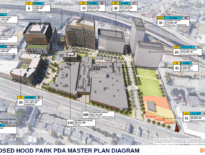Boston has retaliated against commercial landlords that appeal their real property assessments by imposing a surcharge, a legal aid group alleges.
The Pioneer New England Legal Foundation asked state Department of Revenue Commissioner Geoffrey Snyder to investigate the Boston tax assessment department’s recent practices, after reviewing additional charges added to commercial properties’ annual assessments.
In some cases, the charges added “hundreds of thousands of dollars” to properties’ annual taxes, foundation President Frank Bailey wrote in a letter issued Tuesday.
“[T]he city is secretly penalizing those commercial real estate taxpayer who pursue their right of appeal to the [Apellate Tax Board],” Bailey wrote.
Property owners who dispute the city’s valuations can appeal assessments to a state panel.
But documentation provided by undisclosed property owners indicates that the city has imposed additional assessments on those who challenge their valuation, the group claims.
The additional assessments are identified on property record cards as related to an “ATB dispute” or “override, open appeal,” the legal foundation said.
“Essentially, the city is imposing an additional, concealed real estate tax in retaliation for taxpayers’ exercise of their statutory right of appeal to the ATB,” Bailey wrote in the letter to DOR.
The additional fees violate the property owners’ First Amendment rights to criticize government officials and the fair cash valuation of property requirement in state laws and the Massachusetts Constitution, Bailey said.
The letter asks DOR to investigate Boston’s assessing practices, order the city to cease and desist illegal practices and issue refunds to affected property owners. If no action is taken within 30 days, the foundation “expects to take other necessary steps to remedy the situation,” Bailey’s letter states.
The mayor’s office did not respond to a request for comment. A DOR spokesperson said the agency has received the letter and is reviewing it.
The Pioneer New England Legal Foundation was formed through a recent merger of the New England Legal Foundation and the Pioneer Public Interest Law Center.
The dispute takes place amid a lingering debate over fiscal policy and the share of Boston’s tax levy that should be paid by the commercial sector.
In his letter, Bailey asserted that commercial assessments “substantially exceed the fair market value” because of the post-pandemic decline in occupancy.
Mayor Michelle Wu has sought to shift a larger share of the tax levy onto the commercial sector than allowed under state law. The proposed three-year shift in the split tax rate requires approval of the state Legislature.
The state Senate adjourned in December without taking action on a home rule petition submitted by Wu and backed by the Boston City Council. Wu resubmitted legislation in January.
Editor’s Note: Boston Mayor Michelle Wu strongly denied the Pioneer New England Legal Foundation’s allegations when speaking with the press the day after this story was published.









